Acknowledgement Response Resolution To Complaint Letter
Subject: Acknowledgment of Complaint and Commitment to Resolution
Dear [Complainant's Name],
I hope this letter finds you well. I am writing to acknowledge the receipt of your complaint letter dated [Date], regarding [briefly summarize the nature of the complaint]. Please accept my sincere apologies for any inconvenience or dissatisfaction this issue may have caused you.
At [Your Company/Organization's Name], we take customer feedback seriously, and your concerns have been brought to my attention. We deeply value your patronage and are committed to addressing the issues you have raised. Our goal is to ensure that all our customers have a positive experience with our products/services, and we appreciate you bringing this matter to our attention.
I assure you that we are actively investigating your complaint and will take all necessary steps to resolve it promptly and satisfactorily. Our customer service team will be reviewing the details you provided, conducting a thorough investigation, and determining the appropriate course of action. We will keep you informed throughout the process and strive to provide a resolution within [timeframe, if applicable].
Please be assured that we are committed to maintaining the highest standards of quality and customer satisfaction. We value your feedback as an opportunity to improve our services and prevent similar situations from occurring in the future.
Should you have any further information or details to share, please do not hesitate to contact our customer service department at [customer service number] or via email at [customer service email]. Our representatives will be more than willing to assist you and address any additional concerns you may have.
Once again, please accept our apologies for any inconvenience caused. We appreciate your patience and understanding as we work towards a satisfactory resolution. Thank you for bringing this matter to our attention, and we look forward to restoring your confidence in our company.
Yours sincerely,
[Your Name]
[Your Position/Title]
[Your Company/Organization's Name]
Professional Acknowledgement of Customer Service Complaint
Subject: Acknowledgement and Resolution of Your Complaint - Reference #[Case Number]
Dear [Customer Name],
Thank you for bringing your concerns to our attention regarding [specific issue]. We have received your complaint dated [date] and have assigned it reference number [case number] for tracking purposes.
I want to personally acknowledge the inconvenience you have experienced with [product/service]. Your feedback is invaluable in helping us improve our services and maintain the high standards our customers expect.
After reviewing your complaint, I am pleased to inform you that we have implemented the following resolution: [specific resolution details]. Additionally, we have taken steps to prevent similar issues from occurring in the future by [preventive measures].
As compensation for the inconvenience caused, we would like to offer you [compensation details]. This gesture reflects our commitment to customer satisfaction and our appreciation for your patience.
Please contact me directly at [contact information] if you have any questions about this resolution or if you need further assistance. We value your business and look forward to serving you better in the future.
Sincerely,
[Your Name]
[Title]
[Company Name]
Formal Acknowledgement of Legal Complaint
Subject: Formal Acknowledgement of Legal Complaint - Case Reference [Number]
Dear [Complainant Name/Legal Representative],
This letter serves as formal acknowledgement of your complaint dated [date] concerning [nature of legal complaint]. We have received all documentation you provided and have assigned this matter case reference number [case number].
Our legal department has conducted a preliminary review of your allegations and supporting documentation. We take all legal matters seriously and are committed to addressing your concerns through appropriate channels.
Based on our initial assessment, we propose the following course of action: [proposed resolution/next steps]. We believe this approach will address the core issues raised in your complaint while ensuring compliance with all applicable laws and regulations.
We have appointed [Attorney Name] from our legal team to handle this matter. All future correspondence should be directed to [contact information]. We anticipate providing a comprehensive response within [timeframe] business days.
Please be advised that this acknowledgement does not constitute an admission of liability or wrongdoing. We remain committed to resolving this matter fairly and expeditiously.
Respectfully,
[Your Name]
[Title]
[Organization Name]
Heartfelt Acknowledgement of Personal Grievance
Subject: Acknowledging Your Concerns and Moving Forward Together
Dear [Name],
I received your message about [specific issue], and I want you to know that I've given it considerable thought and reflection. Your feelings and concerns are completely valid, and I appreciate your courage in addressing this matter with me directly.
I understand that my actions/words regarding [specific situation] have caused you pain and disappointment. Looking back, I can see how [acknowledgment of impact] and I take full responsibility for my part in this situation.
I want to make things right between us. Here's what I propose: [specific actions or changes]. I'm committed to [specific commitments] because our relationship means a great deal to me.
I know that rebuilding trust takes time, and I'm prepared to be patient while demonstrating through my actions that I'm serious about change. Would you be willing to meet and discuss this further? I believe we can work through this together.
Thank you for giving me the opportunity to address your concerns. I hope we can move forward in a positive direction.
With sincere regards,
[Your Name]
Official Government Agency Complaint Response
Subject: Official Response to Citizen Complaint - File #[Reference Number]
Dear [Citizen Name],
The [Department/Agency Name] acknowledges receipt of your formal complaint submitted on [date] regarding [subject matter]. Your complaint has been assigned file number [reference number] for official tracking purposes.
We have reviewed your concerns about [specific issue] and understand your frustration with [situation details]. As a government agency committed to serving the public interest, we take all citizen complaints seriously and conduct thorough investigations.
Our preliminary investigation has revealed [findings]. Based on these findings, we have initiated the following corrective actions: [specific actions taken]. These measures are designed to address your immediate concerns and prevent similar issues from affecting other citizens.
You will receive a detailed written report of our investigation within [timeframe]. If you are not satisfied with our resolution, you have the right to appeal this decision through [appeals process] within [timeframe] of receiving our final determination.
For questions regarding this matter, please contact our Citizen Services Division at [contact information], referencing file number [reference number].
Respectfully yours,
[Official Name]
[Title]
[Department/Agency Name]
Quick Email Response to Minor Complaint
Subject: Quick Resolution - Re: Your Recent Concern
Hi [Name],
Thanks for reaching out about [issue]. I totally get why this would be frustrating!
Good news - I've already taken care of it. [Brief description of resolution]. You should see the changes reflected by [timeframe].
If anything else comes up or if this doesn't fully address your concern, just shoot me another email. Always happy to help!
Best,
[Your Name]
Serious Acknowledgement of Safety Complaint
Subject: URGENT: Safety Complaint Resolution - Immediate Action Taken
Dear [Name],
We have received and thoroughly investigated your safety complaint dated [date] regarding [specific safety issue]. The safety and well-being of our [employees/customers/community] is our highest priority.
Upon immediate investigation, we discovered [findings] and have taken the following emergency actions: [immediate safety measures]. These measures were implemented within [timeframe] of receiving your complaint.
Additionally, we have initiated a comprehensive safety audit of [relevant areas/processes] and will be implementing new safety protocols including [specific protocols]. A third-party safety consultant will verify compliance within [timeframe].
We are treating this matter with the utmost seriousness. Our safety officer [Name] will contact you within 24 hours to discuss any additional concerns and provide updates on our ongoing safety improvements.
Thank you for bringing this critical matter to our attention. Your vigilance helps protect everyone in our community.
Sincerely,
[Your Name]
[Title]
[Organization Name]
Casual Response to Neighbor Complaint
Subject: About Your Concern - Let's Work It Out!
Hey [Neighbor's Name],
I got your note about [issue] and wanted to respond right away. First off, I'm really sorry this has been bothering you - I honestly had no idea it was causing problems!
I totally understand where you're coming from. If I were in your shoes, I'd probably feel the same way. Here's what I'm going to do to fix this: [specific actions].
I'm also thinking we could [additional solution/compromise] if that works better for you. I'm pretty flexible and just want to make sure we're both comfortable.
How about we grab coffee this weekend and chat about it? I'd love to clear the air and make sure we stay on good terms. Neighbors should look out for each other, right?
Thanks for bringing this up instead of just stewing about it. I really appreciate the direct communication.
Talk soon,
[Your Name]
Provisional Response to Workplace Complaint
Subject: Provisional Response to Your Workplace Complaint - Investigation Underway
Dear [Employee Name],
This message serves as acknowledgement of your workplace complaint submitted on [date] concerning [nature of complaint]. We have assigned case number [number] to your matter for tracking purposes.
Please be advised that this is a provisional response while we conduct a thorough investigation. We have initiated preliminary interviews with relevant parties and are reviewing all pertinent documentation and policies.
During this investigation period, we want to ensure your continued comfort and safety in the workplace. As an interim measure, we have implemented [temporary arrangements] effective immediately. These arrangements will remain in place until our investigation is complete.
Our investigation is expected to conclude within [timeframe]. You will receive a detailed written response with our findings and final resolution at that time. Please note that all information related to this complaint will be handled confidentially in accordance with company policy and applicable laws.
If you experience any retaliation or have additional concerns during this period, please contact me immediately at [contact information].
We appreciate your patience as we work to resolve this matter fairly and thoroughly.
Best regards,
[HR Representative Name]
[Title]
Human Resources Department
What is an Acknowledgement Response Resolution Letter and Why is it Important?
An acknowledgement response resolution letter is a formal communication that confirms receipt of a complaint, addresses the concerns raised, and provides specific solutions or resolutions. This type of letter serves multiple critical purposes: it demonstrates professionalism and respect for the complainant, provides legal documentation of the organization's response, helps maintain relationships, and shows commitment to problem-solving. These letters are essential for maintaining trust, preventing escalation of conflicts, and demonstrating accountability in both personal and professional contexts.
Who Should Send Acknowledgement Response Resolution Letters?
- Customer service representatives and managers addressing client complaints
- HR professionals responding to employee grievances and workplace issues
- Government officials and civil servants handling citizen complaints
- Legal departments managing formal disputes and legal matters
- Healthcare administrators addressing patient concerns
- Educational institution administrators responding to student or parent complaints
- Property managers dealing with tenant issues
- Business owners addressing vendor or supplier complaints
- Individual professionals responding to client dissatisfaction
- Personal individuals resolving conflicts with friends, family, or neighbors
When Should You Send These Letters?
- Immediately after receiving any formal written complaint (within 24-48 hours)
- When a verbal complaint needs formal documentation and resolution
- After completing an internal investigation into reported issues
- When legal action has been threatened or initiated
- Following safety incidents or security breaches
- When regulatory compliance issues have been raised
- After service failures that impact multiple customers or stakeholders
- When relationship preservation is critical to ongoing business or personal connections
- Before implementing major policy changes in response to complaints
- When media attention or public scrutiny is involved in the complaint
Requirements and Prerequisites Before Writing
- Complete documentation of the original complaint including dates, names, and specific issues
- Internal investigation or fact-finding to understand all aspects of the situation
- Consultation with relevant departments (legal, HR, safety, management)
- Review of applicable policies, procedures, and legal requirements
- Authorization from appropriate supervisors or decision-makers for proposed resolutions
- Gathering of supporting documentation, evidence, or expert opinions
- Assessment of financial implications and budget approval for compensatory measures
- Verification of contact information and preferred communication methods
- Understanding of any deadlines or time-sensitive requirements
- Preparation of any necessary attachments, forms, or supporting materials
Formatting Guidelines and Best Practices
Letters should be 200-500 words for simple issues, 500-1000 words for complex matters. Use professional letterhead for business correspondence and maintain consistent formatting throughout. The tone should match the severity and nature of the complaint - formal for legal matters, warm for personal relationships, authoritative for safety issues. Include specific reference numbers, dates, and contact information for follow-up. Use clear, concise language avoiding jargon or technical terms unless necessary. Structure should include acknowledgement, investigation summary, resolution details, and next steps. For digital communications, ensure proper subject lines and professional email signatures.
Essential Elements and Structure Components
- Clear subject line referencing the original complaint and case numbers
- Formal greeting using appropriate titles and correct name spelling
- Acknowledgement statement confirming receipt and understanding of the complaint
- Summary of the investigation process and key findings
- Detailed explanation of proposed or implemented resolution
- Timeline for completion of any ongoing actions
- Compensation or remedial measures being offered
- Contact information for follow-up questions or concerns
- Professional closing with full name, title, and organization
- Reference numbers for tracking and future correspondence
- Attachments section listing any supporting documents
After Sending - Follow-up Actions Required
Monitor response deadlines and ensure timely follow-through on all commitments made in the letter. Implement tracking systems to monitor progress on promised actions and resolutions. Schedule follow-up communications to confirm complainant satisfaction with the resolution. Document all subsequent interactions and maintain comprehensive case files. Coordinate with relevant departments to ensure policy changes or procedural improvements are implemented. Prepare for potential appeals or escalations if the complainant remains unsatisfied. Conduct internal reviews to identify systemic issues that may need addressing. Update complaint tracking systems and generate reports for management review.
Pros and Cons of Sending Acknowledgement Response Letters
Advantages: Demonstrates professionalism and accountability, provides legal documentation of response efforts, helps preserve relationships and prevent escalation, shows commitment to problem-solving, builds trust and credibility, creates opportunities for service recovery, documents lessons learned for future improvement.
Disadvantages: May create legal liability if not carefully worded, requires time and resources to investigate and respond properly, could raise expectations for future complaint handling, might encourage frivolous complaints, can be costly if significant compensation is offered, may require ongoing follow-up and monitoring.
Common Mistakes to Avoid When Writing
Never admit legal liability or fault without consulting legal counsel first. Avoid making promises that cannot be kept or exceed your authority to authorize. Don't ignore deadlines or fail to respond within reasonable timeframes. Avoid defensive language or dismissive attitudes toward legitimate concerns. Don't provide incomplete information or fail to address all aspects of the complaint. Avoid using template responses that don't address specific issues raised. Don't forget to proofread for errors or inconsistencies. Avoid sharing confidential information about other parties. Don't make assumptions about what the complainant wants without asking. Avoid vague language about resolutions or next steps.
Tips and Best Practices for Effective Letters
Personalize each response to show individual attention and care. Use active voice and positive language to convey commitment to resolution. Be specific about timelines and concrete actions being taken. Include the complainant in the solution process when appropriate. Thank the complainant for bringing the issue to attention. Provide multiple contact methods for follow-up communications. Use empathy and acknowledge the impact on the complainant. Offer alternatives if the primary resolution isn't acceptable. Keep copies of all correspondence for legal and training purposes. Train staff on appropriate response techniques and company policies.
Compare and Contrast with Alternative Approaches
Unlike simple acknowledgement emails that only confirm receipt, resolution letters provide complete responses with specific actions. Compared to phone calls, written responses create permanent documentation and ensure all parties have the same information. More comprehensive than apology letters, these responses include concrete solutions and preventive measures. Different from legal responses that focus on liability protection, these letters prioritize relationship preservation and customer satisfaction. Unlike automated responses, personalized resolution letters demonstrate individual attention and care for each complainant's specific situation.
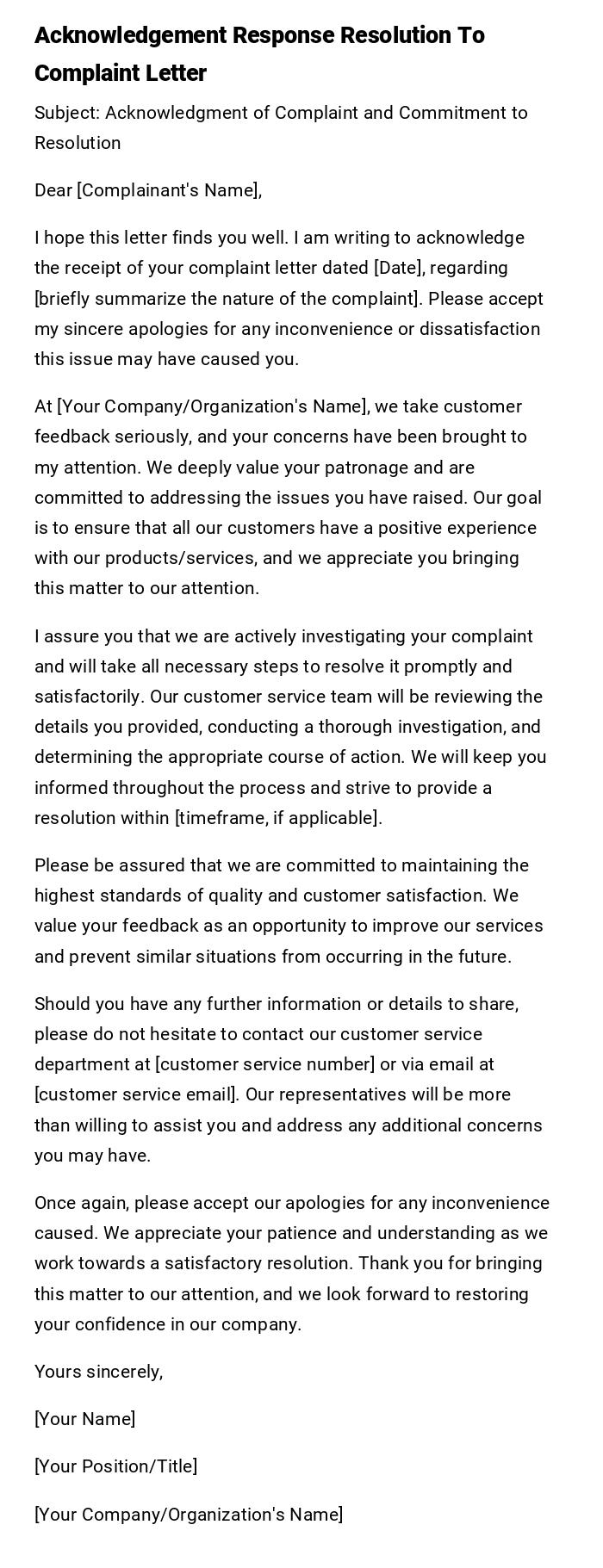
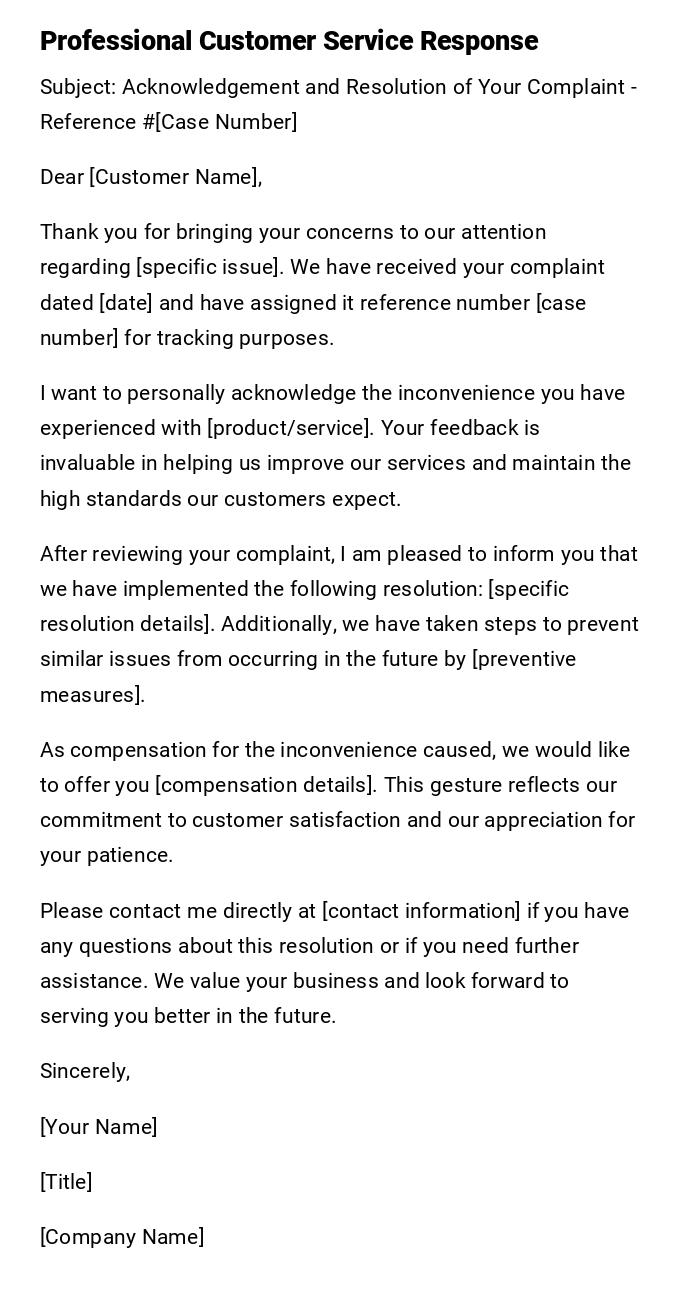
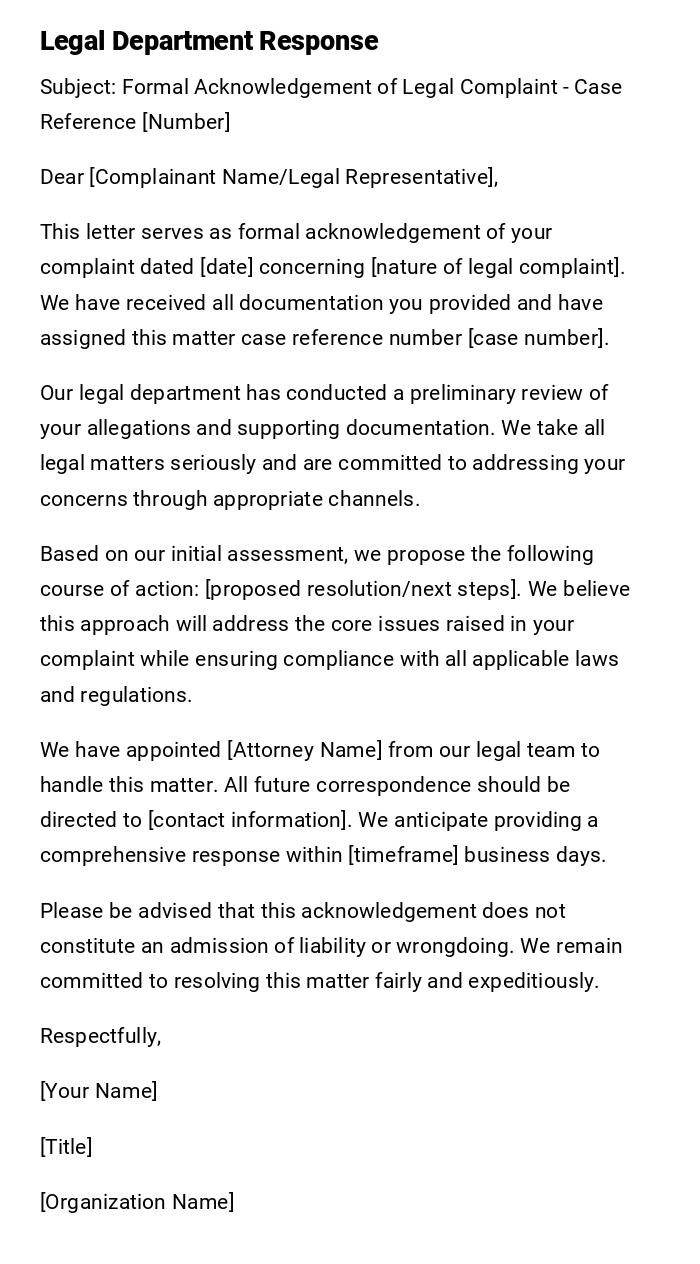
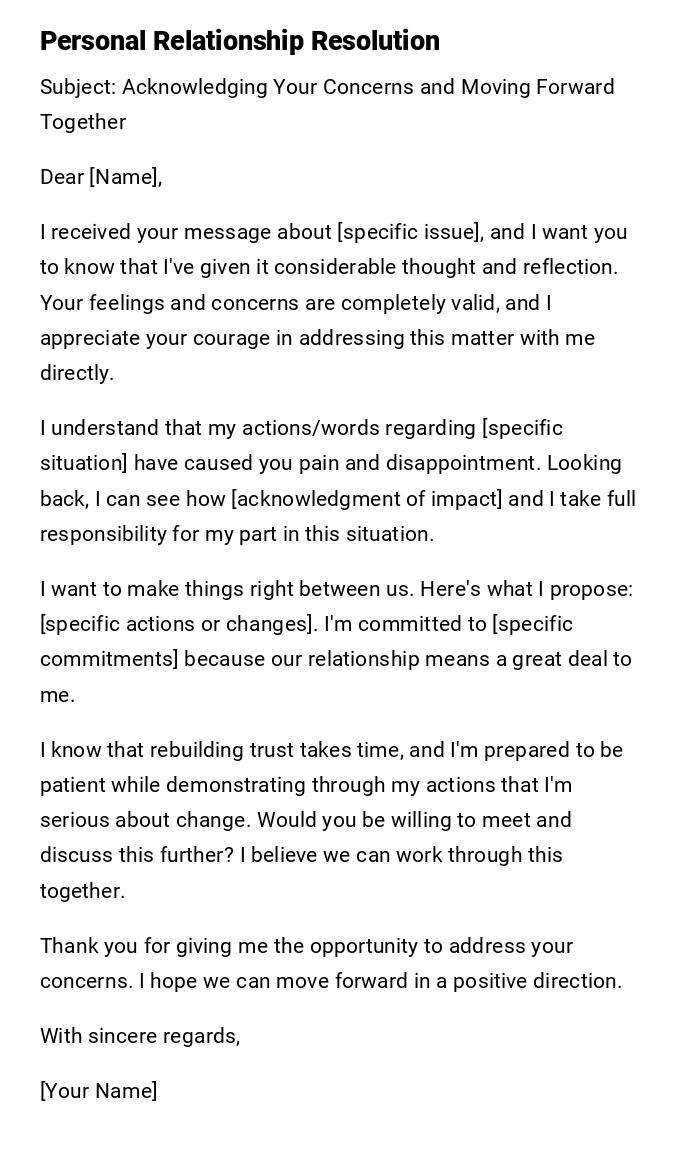
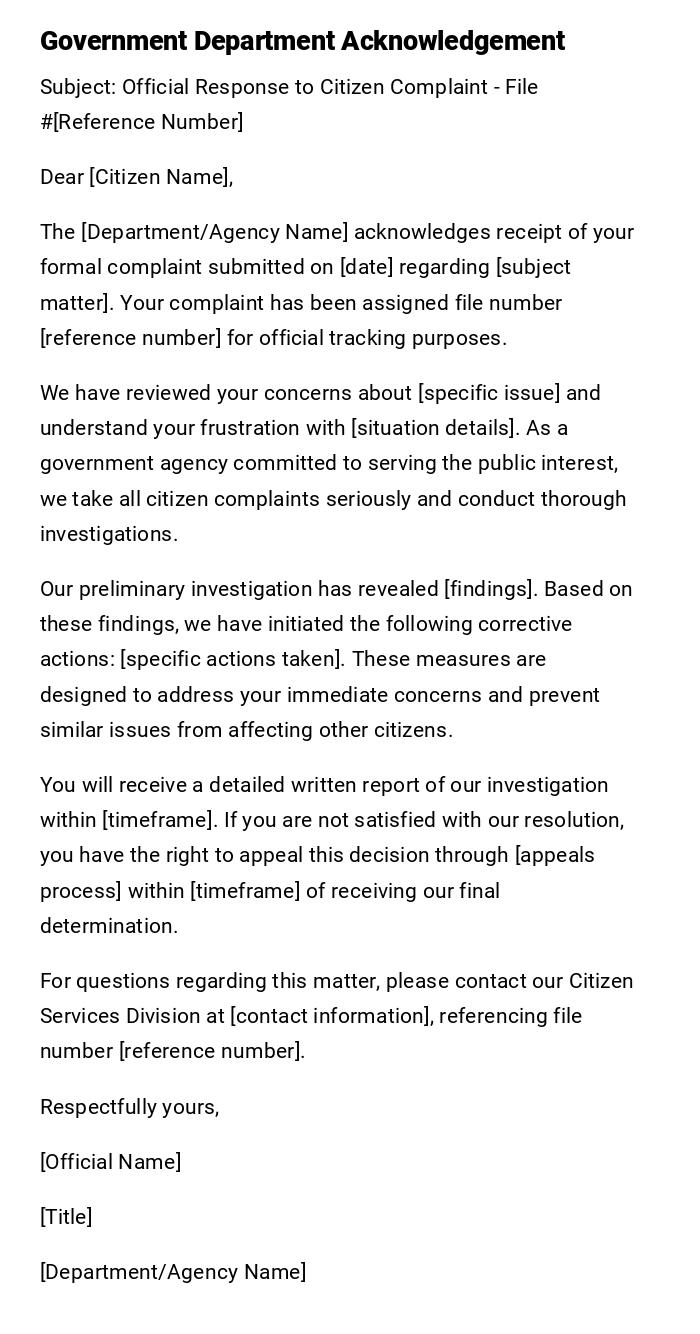
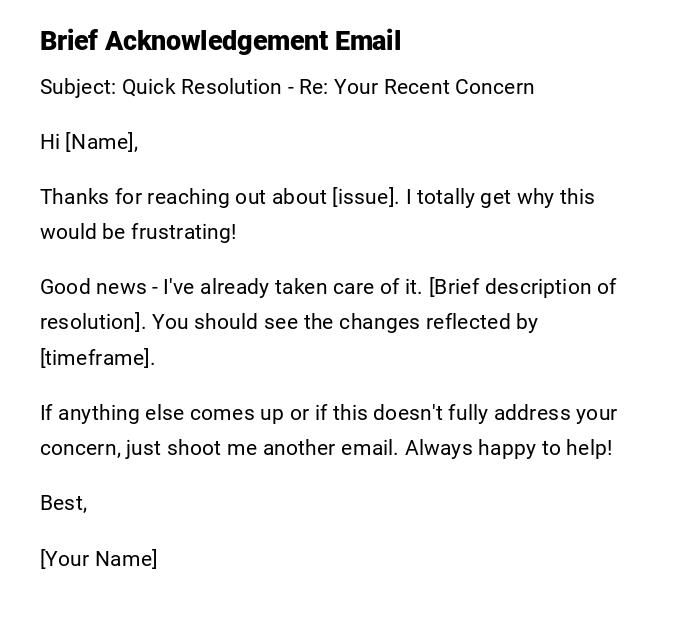
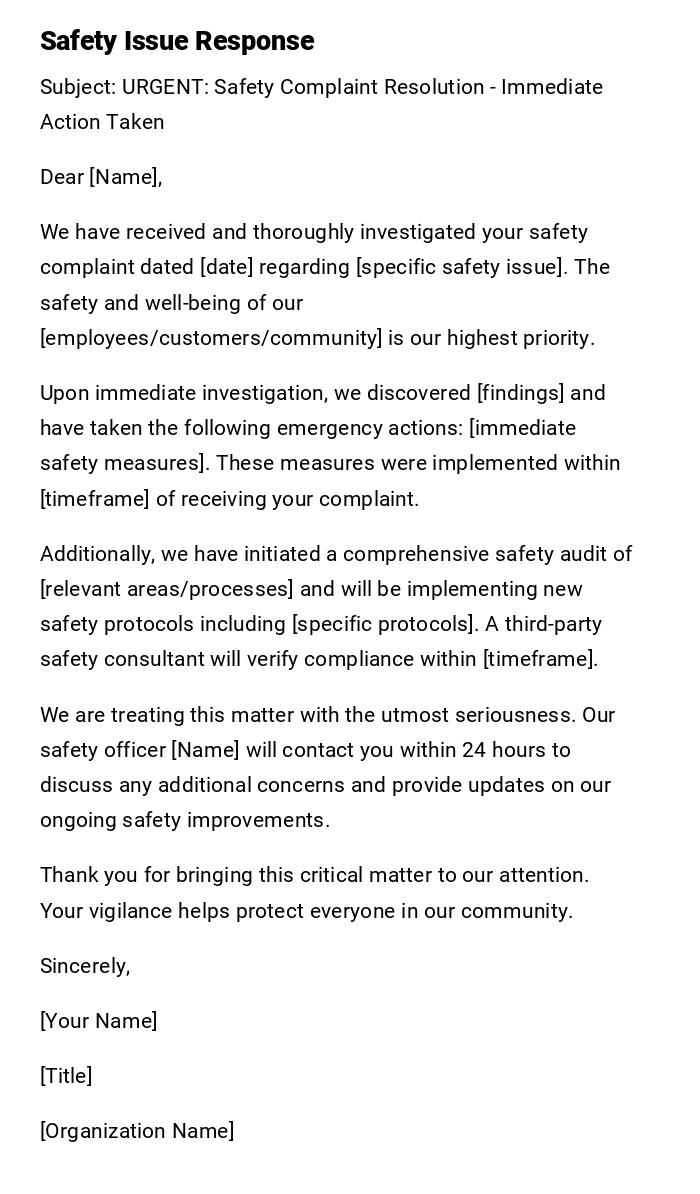
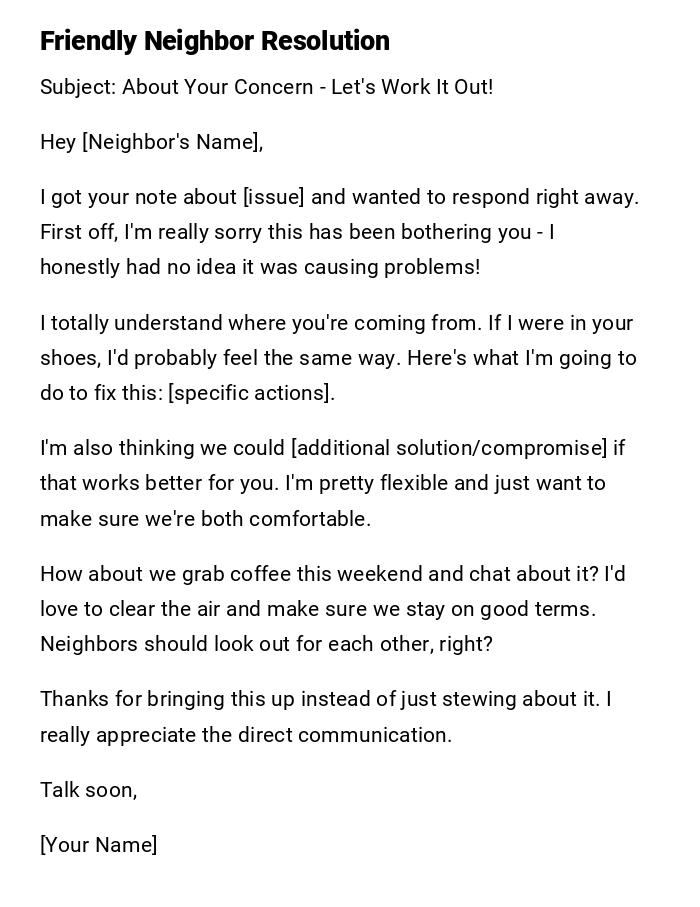
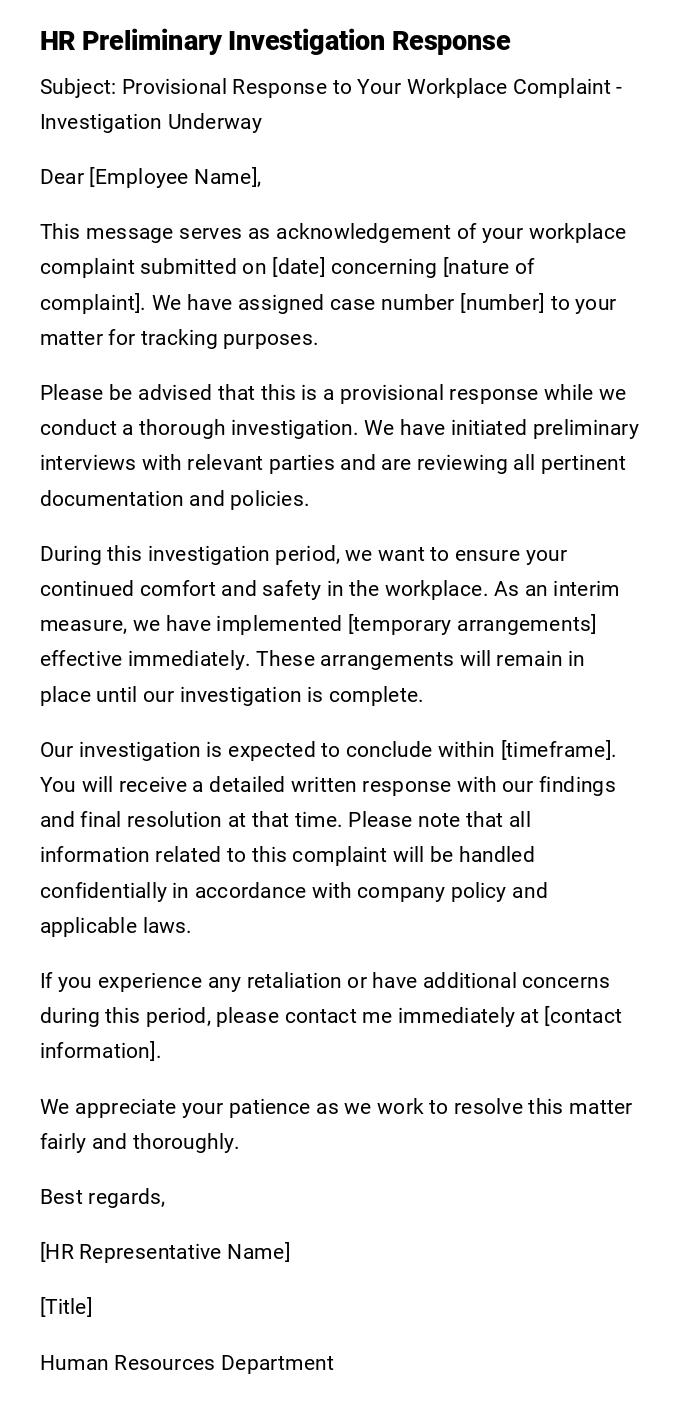

 Download Word Doc
Download Word Doc
 Download PDF
Download PDF